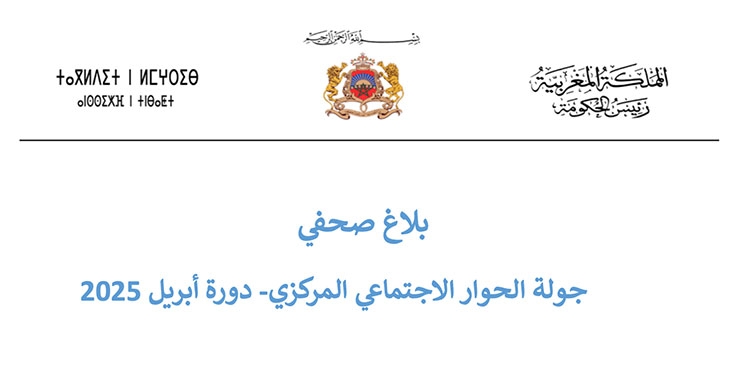Central Social Dialogue Round – April 2025 Session (Press Release)

In consecration of the importance of social dialogue, which draws its reference from the High Royal Directives, and in implementation of the National Pact for the Institutionalization of Social Dialogue, the government invited the most representative unions, the General Confederation of Moroccan Enterprises and the Moroccan Confederation of Agriculture and Rural Development to a series of meetings, chaired by the Head of Government, as part of the April 2025 session.
These meetings provided an opportunity to review the main achievements of the social dialogue, to monitor the implementation of mutual commitments, and to outline the next steps, notably the completion of the implementation of the two social agreements concluded with social and economic partners, dated April 30, 2022, and April 29, 2024.
The holding of this session takes place in a context marked by a track record rich in achievements, realized thanks to the combined efforts of all concerned partners and their positive involvement in implementing the outcomes of the social agreements, which allowed for the increase of incomes and the improvement of the purchasing power of the working class, as well as the strengthening of their social protection.
At the level of the public sector, on July 1, 2024, the first tranche of the general salary increase set at 1000 dirhams net per month in two tranches was paid. This increase benefited all civil servants in public administrations, local authorities, and public institutions who had not benefited from a salary upgrade on the occasion of the general salary increase.
In the same context, the government ensured, through sectoral dialogues, the implementation of a series of measures that improved the incomes of civil servants, notably in the national education sector for a total financial cost of over 17 billion dirhams, for higher education sector staff with a budget envelope of 2 billion dirhams, and for health sector staff at a financial cost of about 3.5 billion dirhams.
These measures will raise the average net monthly salaries in the public sector to 10,100 dirhams by 2026, compared to 8,237 dirhams in 2021, and increase the net minimum monthly salary in the public sector, which rose over the last five years from 3,000 dirhams to 4,500 dirhams, a 50% increase. The overall cost of all these measures will thus reach 45.7 billion dirhams in 2026.
In the private sector, the guaranteed interprofessional minimum wage in non-agricultural activities (SMIG) was increased by 15%, with the net monthly wage thus increasing from 2,638.05 dirhams to 3,046.77 dirhams, a monthly increase of 408.72 dirhams.
Likewise, the guaranteed agricultural minimum wage in agricultural activities (SMAG) was increased by 20%, with the net monthly wage increasing from 1,859.79 dirhams to 2,255.27 dirhams, a monthly increase of 395.48 dirhams.
Regarding social protection, insured persons who have not accumulated 3,240 contribution days will be able to benefit, for the first time, from the retirement pension, thanks to the reduction of the eligibility condition from 3,240 to 1,320 days of contribution, with retroactive effect covering those who retired on January 1, 2023. Likewise, insured persons who reached the legal retirement age and accumulated fewer than 1,320 contribution days, or their beneficiaries in the event of death, may recover the employer contribution share in addition to their own contributions, as was previously the case.
Furthermore, the income tax regime applied to workers in both public and private sectors was revised starting January 1, 2025, with a reduction totaling 6 billion dirhams, which improved the income of different categories by more than 400 dirhams.
In this regard, and in response to requests from social and economic partners, the government reaffirmed its determination to continue implementing the commitments contained in the social agreements and to open the debate on current issues.
To this end, the government commits to continue improving incomes in the public sector by paying the second tranche of the general salary increase of 500 dirhams in July 2025. In the private sector, the guaranteed minimum wage in non-agricultural and agricultural activities will be increased by 5%, effective January 1 and April 1, 2026, respectively, along with the gradual unification of the guaranteed minimum wage by 2028, through the study of methods and measures to implement this commitment.
As part of handling category-specific files, it was agreed between the Ministry of the Interior and the relevant unions to continue discussions on the special status of local authority civil servants with a view to reaching appropriate solutions to the outstanding issues related to this status, which concerns over 84,000 civil servants. A new meeting is scheduled for May 13, 2025.
The government has also committed to opening the debate on revising the special statutes of certain professions (engineers, administrators, technicians, labor inspectors, etc.) to improve their working conditions.
Regarding labor laws, particularly those related to trade unions and the amendment of the labor code, the government committed to establishing specialized commissions including representatives of all partners, which will work on developing consensual versions of these texts that meet the expectations of social and economic partners.
The April 2025 social dialogue session was also an opportunity to engage in a responsible dialogue on pension system reform, which led to an agreement among social and economic partners for the creation of a national commission for pension system reform, which will work on establishing a consensual vision for the reform, taking into account the fundamental principles agreed upon in the April 2024 social agreement.
The consecration of the institutionalization of social dialogue depends on the regularity of sectoral dialogue. All government departments are therefore invited to continue dialogue with social and economic partners with the goal of reaching efficient and feasible solutions to the issues raised, in order to meet workers' aspirations. In this regard, a circular from the Head of Government will be distributed to the relevant sectors and the Head of Government will oversee the follow-up of the results of these sectoral dialogues.




